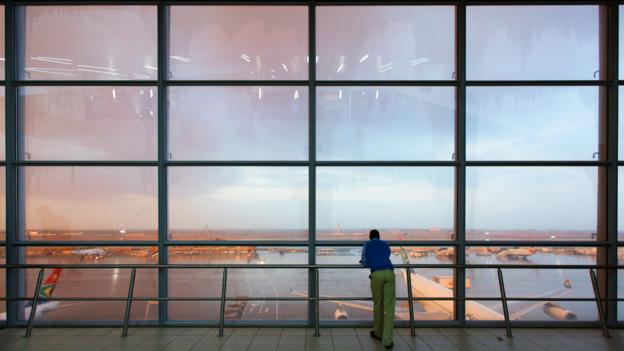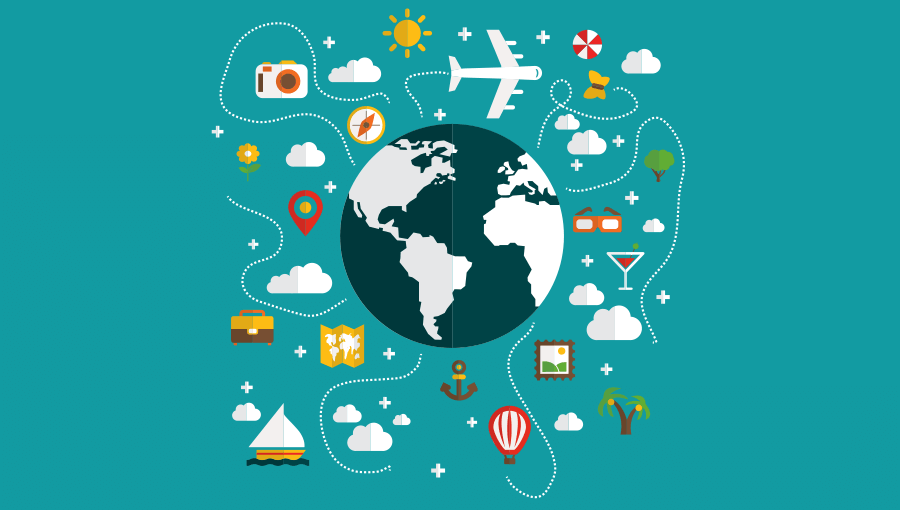
For three trying days I had been traversing Africa, trying to get from Niger to Kenya. The bulk of my time had been spent dealing with sour officials, hopelessly battling malarial mosquitoes and sitting wretchedly in filthy, stinking-hot airports. I had come from three tough but rewarding weeks in the Sahara, and the great beauty and monstrous insouciance of the desert had left me with a feeling of serene detachment.
By the time I arrived in Johannesburg to catch my fourth and final flight to Nairobi – 19 hours behind schedule – that hard-earned peaceful detachment had gone. All tolerance had fled. I had 25 minutes to catch my flight, and I was faced with an obscenely lengthy queue snaking towards a line of passport control booths.
South Africa, a crucible of long-quashed anger and a now-flailing backlash, was in turmoil. World press had seized on the stories of crime, violence and internationally linked corruption. In response, South Africa’s authorities had decided to force all visitors, even those transiting, to undergo document inspections. This impossible delay rang a resounding death knell to my Kenya safari plans.
I stared out of an airport window in misery. Dusk was approaching. Rain exploded on the ground. Hunched, glistening figures lurched through the downpour as if under attack. The thought of being caught in this city alone, with no money to afford a decent hotel, struck me with paralyzing dread.
When I turned back to the room, there was a young man lingering beside me. I stared at him stonily, in no mood for small talk.
“Hello,” he said cheerfully. “Can I help you? You look in need of some assistance.”
I judged him to be in his mid-20s, possibly 10 years my junior. He was short, slight and brown skinned, with a South African accent. He was dressed in jeans and a beer emblem T-shirt, with a well-used backpack slung over one shoulder – the global uniform of the travelling student.
“I doubt you can help,” I replied dismissively. “I was supposed to be in Nairobi tonight. I had to be in Nairobi tonight. However, my plane is about to leave without me.”
“Oh, dear,” he said, and his eyes showed genuine sympathy for my situation. “Right, well then, let’s see if there’s anything we can do about that. Come with me.” He moved off briskly, but I remained where I was, confused, embarrassed and reluctant to lose my place in line. He stopped and gestured for me to follow. This time I did, although hesitantly. He cut to the head of the queue, approached an official and spoke to her in Afrikaans. She regarded me coldly but said nothing as I walked past without showing any documentation.
“Wait here,” he instructed, indicating a row of seats. “Which airline were you on? Right then, let me see if I can hold that flight for you. Won’t be a mo’.”
I sat, trying to imagine who this young man could be that he could circumvent immigration officials and stop planes.
He returned shaking his head. “Sorry, it’s gone. It was the last one out tonight and all the flights tomorrow are solidly booked.”
I obviously looked stricken as he then said, “Don’t worry, we’ll get you on a plane. I’m Ron*, by the way.” He stuck out his hand.
Curious as to whom the “we” was that could get me on a flight, I looked him in the eyes and asked, “Ron, I was wondering… how did you know I needed help back there? Do you work here? What is it you do?”
“FBI,” he replied, as casually as if he’d said “janitorial staff”.
My job is to look for anxious people. And you looked rather anxious.
“I’m on loan to the South African government from the US. Illegal immigration, drug smuggling, terrorism, that sort of thing. We’re here to train their authorities. My job is to mingle with crowds and look for anxious people – suspects in fact. And you looked rather anxious.”
“You thought I was smuggling drugs?” I said, horrified.
“No, no,” he answered earnestly, smiling. “I just thought you looked like a fellow American in need of assistance. But you’re not American after all, are you. You must’ve lived there quite a while now, although you weren’t born there. New Zealand, right? You fooled me, I had you pegged for American.”
I was shocked. He had not seen my passport, nor was I wearing running shoes, a baseball cap, a collegiate sweatshirt or any other dead giveaways of Americanism. He was correct – and he had gleaned all this from the few words I had spoken. I suddenly felt exposed and defensive.
“But you’re not American, either,” I accused him. His English was thick with Afrikaans. Even his vernacular was Southern African.
“I am. I’m from El Paso, Texas. Been here four months now. Languages are sort of my thing. Afrikaans most recently.”
Observing him more closely, it occurred to me that he was the perfect undercover agent, if that’s what he could be called. With his mocha skin, brown eyes and brown hair, he could have been North African, Arab, Mexican, Indian or South American. Being blond, pale and tall, my entire being shrieks foreigner in most parts of the globe. How extraordinary it must be, I thought, to be able to fit in anywhere.
“Look,” he said kindly. “You look tired. Do you have somewhere you can go? I know a hotel. It’s not too expensive, and it’s clean, safe, relatively close. I could drop you off there, it’s on my way home. We’ll pick up your luggage; they’ll send it through now that you missed the flight.”
I was at the point where I had to decide whether to trust him or not. Women travelling alone are persistently faced with this dilemma. Rather than be paralyzed by suspicion, we have to learn to rely on the murmurings of instinct, to calculate the risk – and then in the end to hope like hell those instincts are correct.
“Do you happen to have any ID on you, Ron?” I asked. “I don’t doubt you, but, you know, it’s just smart…”
Women travelling alone are persistently faced with this dilemma
He pulled out a plastic card with ‘FBI’ printed in block letters, his name and a photo. I peered at the picture, in which he looked completely different. He was, indeed, a true human chameleon. The situation suddenly seemed surreal and I resisted the urge to laugh. We all know people like Ron exist, but somehow they do so in a reality not our own, or in movies.
“I can take you to the hotel,” he said, “but there’s one thing I have to do before we leave. You can come along if you like.”
I had nothing better to do, and by now I was extremely curious. I followed.
We stopped at an airport restaurant where Ron purchased meals in large quantities, explaining the situation as he took the money out of his wallet.
“We arrested some Pakistanis this morning. They were trying to get up to Nairobi on false passports. We’re deporting them tomorrow. Just thought I’d drop by and deliver this to them. The police can’t afford food for deportees here.”
I was surprised by how much he was telling me, and even more so as I followed him behind the security doors and through the inner workings of the airport. People nodded at Ron, but no-one bothered to ask who I was or why I was there. Probably they assumed I was a suspect.
We entered a barren concrete building adjoining the airport. A long, narrow corridor was lit with fluorescent light and littered with drink cans and cigarette butts. There were no windows, only opposing rows of closed doors. I began to feel uneasy. In a matter of hours I had been shepherded from the innocence of the front room traveller to the gritty, behind-the-scenes realm of crime and law enforcement.
A policeman stood guard outside the Pakistanis’ room. He unlocked the door as Ron approached and we entered. Through a serpentine haze of cigarette smoke, I saw three men crouched on a narrow bed and another two on the floor. They were in their 30s, dressed in dark Western clothing. Their eyes were as black as onyx and hard with bitterness and defeat. Ron set the food on a table, speaking in a language I did not recognize, probably Urdu. The men muttered. One said something and Ron dug into his pocket and tossed him a pack of cigarettes. The man inclined his head in grudging thanks. We left the building in silence.
“You must be hungry, too,” Ron said cheerfully as we re-entered the airport to get my bags. “Come on, we’ll stop on the way to your hotel.”
He spoke 23 languages; he could tell the time by the sun.
Over dinner, we spoke mostly about Ron’s job. I could tell he was trying to impress me, but he did it in such an open way it was rather endearing. He spoke 23 languages; he could tell the time by the sun; he was an expert in martial arts; and he had never been seriously attached to a girl. He had been posted to cities all over the world, but he was tired of airport work. What he really wanted to do, he told me, was be an air marshal on international flights. Professionals, he explained, were hired to sit in the centre of the plane with a loaded gun in case of hijacking or other disturbances. “It rarely happens, and you get paid quite well.”
Despite my insistence, he refused to let me pay for dinner, telling me to save my money in case I should be stranded again. Later, he dropped me off at a modest hotel somewhere on the outskirts of the city. He had been every bit the gentleman.
As I left the car he said, “As far as your leaving tomorrow, I checked on flights and there’s one leaving at eight in the morning. It’s full, but I can arrange to get you on. I’ll pick you up at six.”
“No, no, no,” I protested. “You’ve done enough. I won’t get you out of bed at such an ungodly hour. You really are too kind, Ron.”
“I insist,” he said. “I’d rather know you got there safely, and you’ll need me to get you on the flight. I’m deporting you. Sleep well.”
He was there at six, just as he said he would be, armed with the same smile.
At the airport Ron disappeared, returning with a boarding pass.
“Got you on. The airline thinks you are a deportee, but you shouldn’t care so long as you get there. There won’t be any record of it, don’t worry.”
I wasn’t sure how to thank him adequately for all he had done. He had undoubtedly broken rules for me, or most certainly bent them. I wondered if he’d bumped some other traveller from the flight and felt momentary guilt.
As he walked me to the gate, I asked him something I’d wondered the night before.
“Why did you feed those men, Ron? You paid with your own money, didn’t you? I mean, they looked terribly shady.”
Ron sighed and his chin dropped. I felt as if I’d said something dreadful, something terribly disappointing. He stopped walking. “This job,” he said, “has taught me that our presumptions about people are rarely true. We have so many preconceptions, especially about foreigners, but they are nothing more than fear of the unknown. We quite comfortably make sweeping generalisations about entire nations of people. These people we suspect of being evil, most are just students and deadbeat dreamers and artists and teachers and greedy businessmen – the same characters that populate all societies. And then some of them, a tiny portion of them, are actually individuals with intent to harm others. But we foolishly judge them all by the few who are bad.”
Our presumptions about people are rarely true.
Ron was becoming heated, staring vacantly ahead. “I bought those men food because in all likelihood they are simply seeking an improved life. And even if those five individuals aren’t innocents like most of the folk I encounter, even if they are real criminals, then a show of kindness may help, just a little, to debunk their preconceptions about us. Until we can prove them as bad people, it is simply kinder to trust their intentions.”
“Besides,” he added, “everyone has to eat.”
Ron-the-FBI-agent was right, and not only did he help me, a complete stranger, that day, but he taught me a lesson I shall take to my grave: our world just might be a better place if we put a little more kindness and trust into our days.
*Names have been changed.
Amanda Jones is a travel writer and photographer living in the San Francisco Bay Area. She has been published in several travel anthologies including Salon.com’s Wanderlust: Real-Life Tales of Adventure and Romance, and Lonely Planet’s literary anthologies The Kindness of Strangers and By The Seat of My Pants.
If you liked this story, sign up for the weekly bbc.com features newsletter, called “If You Only Read 6 Things This Week”. A handpicked selection of stories from BBC Future, Earth, Culture, Capital, Travel and Autos, delivered to your inbox every Friday.










